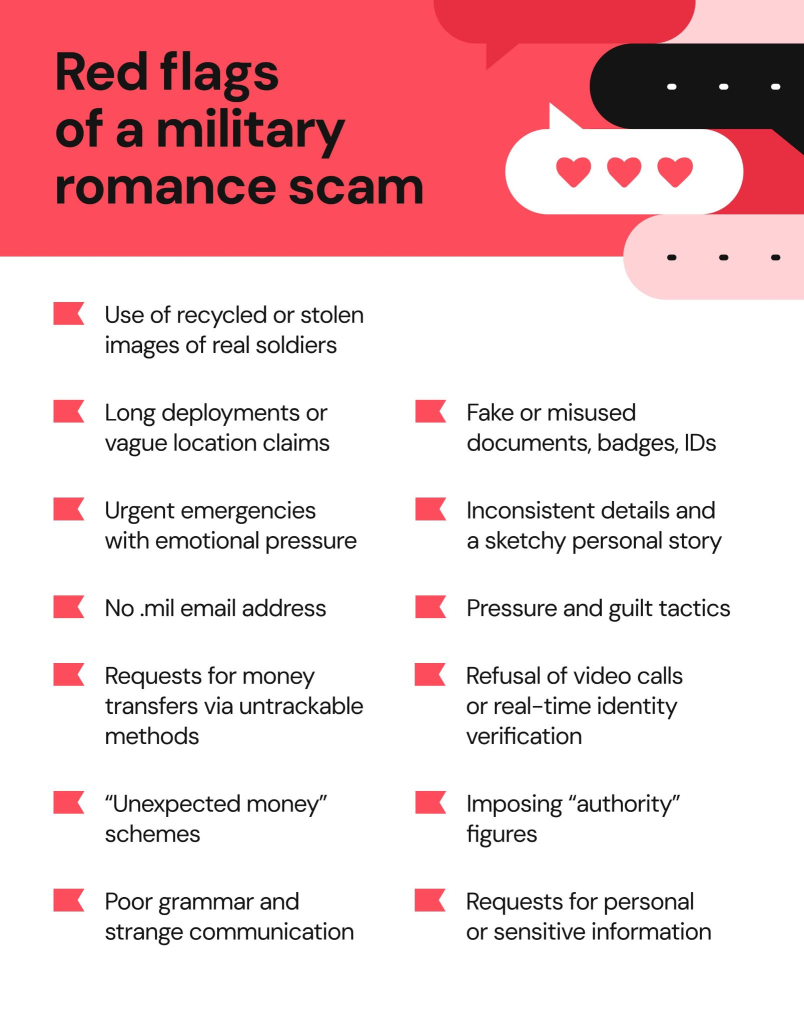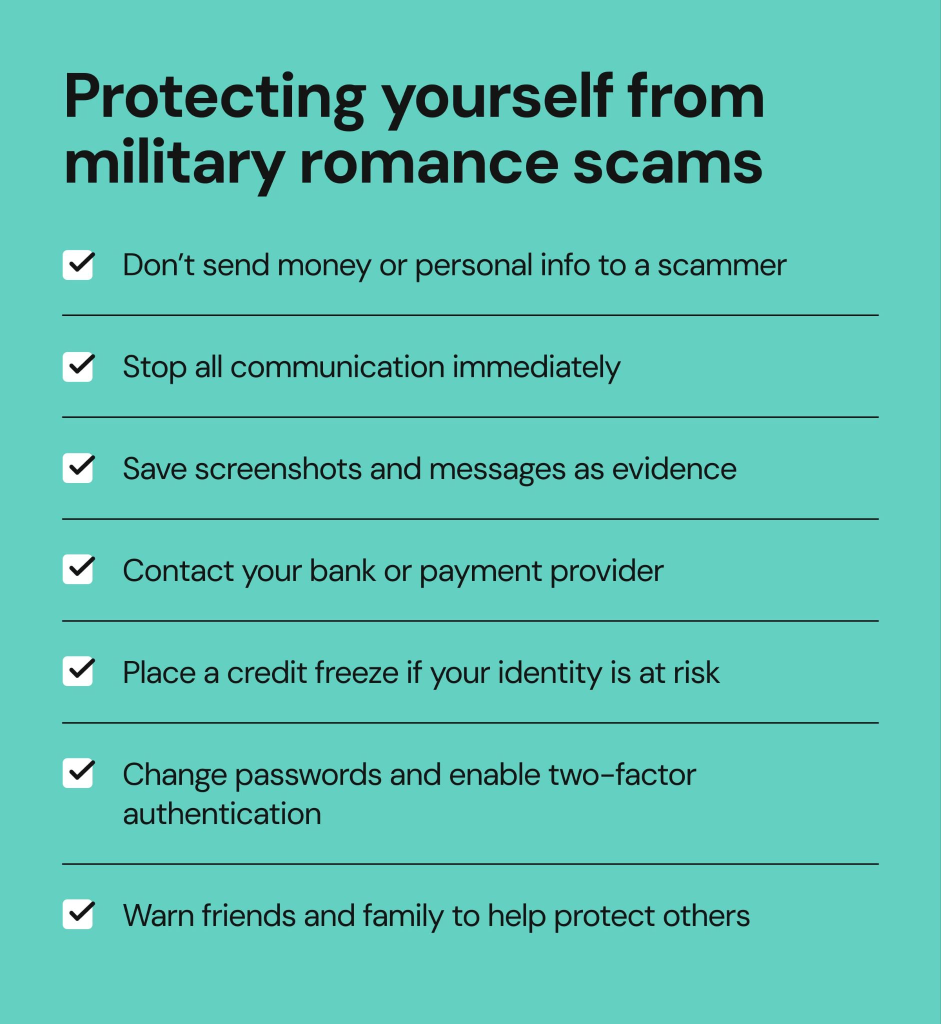Military romance scams: how to spot and avoid them

Online romance provides much needed emotional support for many, but in recent years it has given rise to a new type of scam—military romance scams. In these fraudulent schemes, imposters pretend to be members of the U.S. military stationed abroad, coming up with all sorts of manipulative stories to get victims to send them money or do other favors.
The results can be devastating. According to the FTC’s Consumer Sentinel Network, imposter scams were the third largest category of all scams reported in 2024, with $2.95 billion lost in total. Of those, romance scams accounted for almost 60,000 cases.
Read on to learn how military love scams work, how to recognize such scammers, and what to do to prevent harm to you or your loved ones.
What are military romance scams?
Military romance scams occur when an imposter steals or fabricates a military servant’s identity to create a fake online persona claiming to be a veteran or an active-duty soldier stationed abroad. They exploit the trust and admiration people generally have for service members. Once trust is established, scammers invent emergencies—medical bills to pay, deployment hardships, etc.—and pressure victims to send money or help in other ways.
Victims span all ages and backgrounds, but scammers are especially likely to target widowed or divorced seniors, as well as those who show signs of sympathy and support for the military, combing Facebook groups and online communities in search of their targets. As a result of these scams, victims can be left not only broke but also deeply traumatized, betrayed by someone they believed to be a hero.
How military romance scams work
Online dating scams involving military imposters can start on various online platforms, for example, as part of elaborate Tinder scams or Facebook scams, but all of them unfold similarly.
How military love scams unfold, step by step
First, scammers begin by gathering material to create a believable military identity, typically posing as a soldier, an officer, or even a general. They scrape public social media profiles for photos of real service members or buy stock photos, pull basic demographic data from public data broker sites or exposed profiles, and build a backstory, complete with rank, deployment location, common hobbies, and a daily routine. In this way, Petty Officer 1st Class Mike Sency’s identity was stolen back in 2014 and is still used in multiple military impersonation exploits.
Then, military romance scammers set up fake online profiles (sometimes hundreds) and reach out to people looking for romance: on dating sites, social media, or even via email. For example, there are high risks of running into military romance scams on Instagram, where it’s easy to hide behind a fake persona.
After the initial contact, scammers take communication to private messengers like WhatsApp or Telegram and initiate rapid bonding. They start to “lovebomb” and groom their targets with expressions of deep affection, compliments, and of course, heart-breaking stories about how isolated their life is wherever they’re stationed. They may even send photos, such as uniform shots, ID cards, or base scenes, but these images are likely stolen or doctored.
Once the bond is established, scammers typically test the waters with a minor request for financial help. If the victim complies, the requests snowball into larger and more urgent demands for money. They might ask to cover a small medical bill or top up their phone credit before escalating to larger sums—such as airline tickets, emergency surgery, or fees to release money “trapped” overseas—often introducing a third party, such as a “commanding officer.”
If the victim follows through and sends the money, the imposter may cut off contact or continue to exploit the victim, including using them as a money mule (asking them to hold or transfer funds of unknown origin). If the victim refuses to cooperate, the scammer is likely to use blackmail and extortion, or simply move on to the next target.
Why scammers impersonate military servants
People serving in the army are often pictured as symbols of courage, sacrifice, and integrity. Exploiting this image, scammers can win instant trust and credibility. They rely on the assumption that military personnel are perceived as honest and trustworthy by default, so victims are more willing to override any suspicions they may have. The distance of overseas deployments also provides a handy excuse to avoid video calls, either due to a “poor internet connection” or “confidentiality policies” they claim to follow.
Where do military scams happen?
Scammers typically flock to social platforms where people seek companionship and where it’s possible to hide conveniently behind fake profiles due to minimal or zero identity verification requirements.
For example, military scams on Facebook are quite common, with scammers setting up dozens of fake profiles impersonating real military offices using information they’ve found or stolen online. Dating apps—such as Tinder, Plenty of Fish, or Match—are another popular hunting ground for military imposters.
Red flags of a military romance scam
Since many romance scammers follow common scripts to engage and emotionally manipulate their victims, their exploits often share the same tactics and show the same red flags scattered across their conversations.
Watch out for the following telltale signs that you’re dealing with a military impersonator looking to steal your money, identity, or sensitive information:
1. Use of recycled or stolen images of real soldiers
Scammers steal or edit photos of real soldiers found online and fabricate background stories around them using whatever biographical facts they can find or invent.
Do a reverse image search on Google and look up profiles with the same name on social networks. If you see dozens of identical pages for the same person or photos attached to different names or locations, it’s a major red flag.
2. Fake or misused documents, badges, and IDs
To prove they’re legitimate military servants, scammers may try to convince you by sending photos of their ID, badge, or letters with stamps that may look official but are stolen or doctored. These may feature incorrect insignia, odd logos, inconsistent details, or bad grammar.
Know that such information is often confidential in the first place, so if your love interest freely breaks the rules and sends you their identification badges, it’s a major red flag that you’re talking to a scammer.
3. No .mil email address
Legitimate U.S. military officials have designated .mil email addresses. If the person can’t share such an email address with you but instead uses generic @gmail.com accounts or addresses containing extra characters (for example, .yemen-mil), they’re likely a scammer.
4. Long deployments or vague location claims
One of the prime tactics of military scammers is to claim they’re stationed abroad in some remote and dangerous location, which makes them unreachable and more alluring at the same time.
In many cases, scammers get the details wrong and claim they’re deployed to places where the U.S. Army has no presence, so it helps to double-check the facts independently. They may also state they’ve been there for 2-3+ years and are constantly on a mission, even though a typical deployment rarely lasts more than 15 months.
4. Urgent emergencies with emotional pressure
Scammers might pretend they’re injured or ill, need to take care of their children left back in the U.S. (many military romance scammers say they’re widowers), or that there’s been a family tragedy. These stories appear right before they start asking for money to create emotional pressure and guilt.
Know that legitimate military needs, such as hospital fees or deployment-related expenses, are usually covered, and there’s no need for them to involve a stranger unless it’s to defraud them.
5. “Unexpected money” schemes
Scammers frequently claim they’ve suddenly come into possession of a sum of money abroad or some valuables, and now need your help transferring them back home. They might invent stories of customs fees, taxes, or bribes that need to be paid before they can clear the money or package for international shipping, asking for you to cover these expenses in exchange for a share of the money or the value of the package contents (which never arrives).
6. Requests for money transfers via untrackable methods
Scammers love payment methods that are almost impossible to trace—such as instant money transfer apps, crypto, wire transfers, or gift cards. These are common in many known fraud cases, such as Venmo scams and pig butchering.
If your military love interest asks you to send money this way, know that it’s a prime sign of a scam. In addition, real military personnel are not supposed to ask civilians to cover their day-to-day expenses, so beware of such requests.
7. Imposing “authority” figures
Military imposters often call in third parties to add authority, credibility, or more pressure to their claims and money requests. They might bring in their “commanding officers,” superiors, “translators,” or even “UN representatives” as a tactic to press you to send money or follow their instructions. In reality, legitimate soldiers don’t have superiors contacting civilians for financial matters, it’s only other impersonators playing along.
8. Inconsistent details and a sketchy personal story
During conversation, scammers don’t always get all the details right, especially since there may be different people working behind the same fake persona. They might display inconsistent biographical details, contradict previous statements, suddenly change addresses, units, ranks, or deployment timelines, and have a sparse online presence with only minimal social profiles.
9. Requests for personal or sensitive information
In addition to money, military imposters can seek your sensitive information to commit identity theft and financial fraud. Information they might request ranges from credit card data and your Social Security number to copies of your passport, ID cards, and driver’s license. As a result, this information may be used to open bank accounts or apply for loans in your name.
10. Refusal of video calls or real-time identity verification
Impersonators go out of their way to hide their true identity, so it’s common for them to refuse video calls, voice messages, or any form of real-time identity verification. Scammers often cite security reasons, poor internet connection, or a damaged phone camera due to combat, and insist on meeting in person once their deployment is over.
11. Poor grammar and strange communication
Your military love interest may say they’re stationed in Nigeria, but that doesn’t explain broken English. Poor grammar, odd phrasing, and strange conversational patterns may reveal a non-native speaker relying on a scripted scam. If they claim to be a U.S. Army officer stationed abroad, such language issues are certainly a red flag.
12. Pressure and guilt tactics
If you start to hesitate, express doubts, or suspect they’re not who they claim to be, scammers may resort to guilt and scare tactics, using emotional hooks to manipulate the victim into complying. They may use phrases like “If you really loved me, you would help me,” or even start blackmailing you, threatening to reveal your romance and share intimate content (if any) with your family and friends.

What to do if you suspect a military romance scam
If you suspect you’re dealing with a military impersonator, start by protecting yourself to minimize the potential impact. Then, report the scam to relevant platforms and authorities to help stop the criminals from doing more harm.
How to protect yourself from military romance scammers
- Don’t send money or personally identifiable information to the scammer. This can lead to financial losses and risks of identity fraud.
- Stop communication immediately. Trying to prove the scammer wrong or telling them you’re onto them will only waste more of your time and may expose you to further emotional manipulation.
- Preserve screenshots of your communication and any evidence of the scam to use when filing a report.
- If you sent money to the scammer, contact your bank or payment service provider. In some cases, they may be able to cancel the transaction. You can also initiate a chargeback on the grounds of fraud and set up fraud alerts in case your financial information is misused by the scammer.
- Place a credit freeze and consider subscribing to an identity protection service if you suspect your identity has been stolen.
- Secure your digital accounts. Change your passwords and enable two-factor authentication for all key services, such as banking apps and email.
- Warn friends and family. Scammers often target people within the same social circle. Sharing your story can also help raise public awareness about military romance scams.

How to report the scam to authorities
- Report the scammer’s profile if you met them on social media or a dating platform.
- Report military personnel impersonation to the U.S. Army Criminal Investigation Division (CID).
- Report the scam to the Federal Trade Commission.
- Report the scam to the FBI’s Internet Crime Complaint Center.
- If your identity details have been stolen, report it to IdentityTheft.gov.
- Contact your local law enforcement agency if you lost funds or suspect identity theft.
How Onerep helps protect you from online scams
One way military romance scammers find their victims and piece together their convincing stories is through public data brokers and people-search websites that hold multiple personal records about regular citizens without their authorization. Once scammers get hold of someone’s personal details, it becomes much easier for them to personalize their scripts.
Onerep helps by removing your personal records from these websites, making you harder to target. Reduce your digital footprint and lower your risk of being singled out by cybercriminals looking for their next victim.
Try out Onerep for free.
FAQs about military romance scams
Why do scammers pretend to be soldiers?
Scammers impersonate soldiers because they’re more easily trusted. Their service status adds credibility and makes victims more susceptible to manipulation.
What are the signs of a military romance scam?
The top signs you’re dealing with a military romance scammer include the use of stolen photos of real soldiers, excuses about overseas deployment to avoid meeting or video calls, lovebombing, and urgent requests for money due to a personal emergency.
How can I verify if someone is really in the military?
You can verify a person’s military status through the Servicemembers Civil Relief Act (SCRA) website, but a cheaper and faster way is to reverse-search the images used by your military romantic interest and see if they’re not stolen or taken from other people’s profiles.
How common are military romance scams?
Thousands of romance scams are reported each year, and military romance scams make up a significant portion of them. In addition, identities of real military service members are frequently stolen to create fake social media and dating profiles to scam unaware people.
What should I do if I suspect a military romance scam?
Stop all communication, contact your bank if you transferred any money to the scammer, and report the scam to relevant authorities, including your local law enforcement if nedeed. Never send money or your personal information to someone you’ve only met online and suspect to be a scammer.





Mikalai is a Chief Technical Officer at Onerep. With a degree in Computer Science, he headed the developer team that automated the previously manual process of removing personal information from data brokers, making Onerep the industry’s first fully automated tool to bulk-remove unauthorized profiles from the internet.